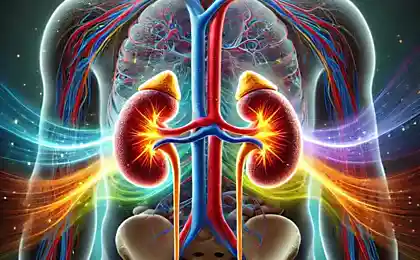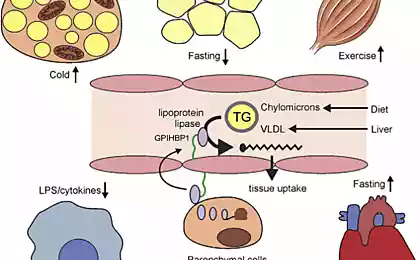515
As stress affects Your hormones
Stress is an important element of our life. A healthy dose of stress helps us to Wake up in the morning to avoid dangerous situations, be effective at work, to set and achieve goals.
Therefore, small doses of stress in everyday life just need. Unfortunately, modern life is full of all kinds of stressful situations, and our task is to learn to control stress and not let stress be the master of our lives, depriving us of sleep and appetite, disrupting the hormonal balance, thereby causing irreparable damage to our health.
As you know, stress is a reaction of our body to a situation in which the blood ejected hormones that help us cope with the problem of the reserve forces of the body.

Cortisol – the main stress hormone.
Cortisol is a hormone released by the adrenal glands and regulates our ability to manage stress. It has a strong effect on many physiological processes in the body: digestion, cardiovascular function, levels of blood pressure. It affects the level of physical activity, sleep quality, and can also stimulate a craving for sweets.
During unexpected stressful situations (e.g., during driving you do not notice the sign and broke the rules), your adrenal gland in seconds, thrown in the blood a large amount of cortisol, causing you feel a surge of energy and begin to think quickly: what it is you face and what to do to avoid problems. Quickly assessing the situation and realizing that the coast is clear (because you weren't seen!), you leave the scene and return to normal life.
Unfortunately, for many people the problem is to return to a normal life — to live in the moment, rather than endlessly relive the dramatic experience of the past or to paint a pessimistic picture of the future. In this state of consciousness (should I say subconscious) the human body is constantly in stress, which generates a series of different kinds of adverse reactions: hypertension, overweight, premenstrual syndrome, poor sleep, hormonal imbalance and much, much more.
To understand how cortisol interacts with all other hormones, such as progesterone, estrogen, testosterone, growth hormone, insulin, oxytocin, thyroid hormones, etc., imagine a fire truck speeding around the city with flashing lights and loud siren. Along the way the pumpers all machines, giving way to a stop.
The same thing happens with most of the hormones in our body under stress: in the presence of cortisol work them suspended or even blocked.
The result – the extra pounds on the waist and hips, mood swings, irregular menstrual cycle, premenstrual syndrome, lowered immunity, digestive problems, poor sleep, benign and malignant neoplasms.
Sustained high cortisol levels (days, weeks, months) in the blood leads to atrophy of the hippocampus (brain structures responsible for memory), resulting in a loss of focus, depression, unstable mood and insomnia. Is mega-constantly producing cortisol, the adrenal glands gradually depleted and begin to dramatically reduce the synthesis of cortisol, which leads to chronic fatigue syndrome, muscle pain, bone demineralization and complete loss of interest in life.
The biggest thing you can do for your health is to control the level of stress and thus cortisol levels in the blood. Pharmaceutical industry offers a rich array of antidepressants and relaxants for the normalization of well-being, but unfortunately, they all have side effects and develop a strong addiction. And, as practice shows, the main problem with a pill will not solve. But a conscious being, control and correction of his behavior and private life leads to desirable and lasting results. Small changes lead to big changes, especially if done regularly.
So, how to control the level of cortisol in the blood:
1. Every day learn to monitor his condition and evaluate it on a 10 - point scale, where 10 points is your perfect physical, emotional and energetic state. Celebrate what and who causes you negative emotions and leads to nekontroliruem mental dialogue, which in turn triggers the physiological response to stress and raises cortisol levels. Being in the position of the observer, you learn to manage your emotions and thoughts, avoiding undesirable reactions of the body. Be patient with yourself and others. Several times a day pause and breathe deeply for 1-2 minutes, helping to restore inner peace and tranquility.
2. Pray. Practice calm exercise, relaxing practice does not only calm the nervous system and balance the level of neurotransmitters of the brain – serotonin and dopamine, responsible for mood.More smile, laugh, watch Comedy programs and Comedy. Laughter boosts serotonin levels and reduces cortisol levels. Treat life easily with a healthy sense of humor, because everything is relative!
3.Tomorrow is another day — says a Russian proverb. A full night's sleep works wonders! It is desirable to be in bed until ten in the evening and sleep at least 8-9 hours daily. At night try not to watch TV and work on the computer, because artificial light reduces the activity of the hormone melatonin, responsible for restful sleep. Sleep harmonizes the nervous system and helps to normalize cortisol levels.
4. Information for lovers of coffee: each Cup of coffee stimulates the release of cortisol by the adrenal glands and, as a consequence, you will immediately feel a surge of energy and mood elevation. Unfortunately, this effect lasts for a short time, and you automatically reach for a second Cup of coffee... in addition to raising cortisol levels, caffeine constricts blood vessels and dehydrates the body. Even a small amount of coffee in the morning reduces the effectiveness of your sleep at night.
Caffeine stimulates the unreasonable anxiety and causes muscle tension (especially in the jaw – facial area). In addition, FEIN disrupts the normal absorption of many vitamins and minerals, leading to mineral and vitamin deficiency in the body.
If you just hard to give up coffee, then at least reduce its use to one or half Cup a day. Add in coffee, cinnamon, cardamom or nutmeg significantly reduces the negative effects of caffeine on the body.
5. Travature: numerous studies have shown that Siberian ginseng and Radiola are not only immunomodulators, and normalize the adrenal glands and regulate the blood cortisol level. In addition, they increase the stress resistance of the organism and regulate the appetite. Stimulating the activity of serotonin and dopamine, Siberian ginseng and Radiola improve mood, helping to cope with depression. published
Author: Ksenia Trushlyakov
P. S. And remember, only by changing their consumption — together we change the world! ©
Join us in Facebook , Vkontakte, Odnoklassniki
Source: hormonetika.com/stress-gormoni-vliynie/
Therefore, small doses of stress in everyday life just need. Unfortunately, modern life is full of all kinds of stressful situations, and our task is to learn to control stress and not let stress be the master of our lives, depriving us of sleep and appetite, disrupting the hormonal balance, thereby causing irreparable damage to our health.
As you know, stress is a reaction of our body to a situation in which the blood ejected hormones that help us cope with the problem of the reserve forces of the body.

Cortisol – the main stress hormone.
Cortisol is a hormone released by the adrenal glands and regulates our ability to manage stress. It has a strong effect on many physiological processes in the body: digestion, cardiovascular function, levels of blood pressure. It affects the level of physical activity, sleep quality, and can also stimulate a craving for sweets.
During unexpected stressful situations (e.g., during driving you do not notice the sign and broke the rules), your adrenal gland in seconds, thrown in the blood a large amount of cortisol, causing you feel a surge of energy and begin to think quickly: what it is you face and what to do to avoid problems. Quickly assessing the situation and realizing that the coast is clear (because you weren't seen!), you leave the scene and return to normal life.
Unfortunately, for many people the problem is to return to a normal life — to live in the moment, rather than endlessly relive the dramatic experience of the past or to paint a pessimistic picture of the future. In this state of consciousness (should I say subconscious) the human body is constantly in stress, which generates a series of different kinds of adverse reactions: hypertension, overweight, premenstrual syndrome, poor sleep, hormonal imbalance and much, much more.
To understand how cortisol interacts with all other hormones, such as progesterone, estrogen, testosterone, growth hormone, insulin, oxytocin, thyroid hormones, etc., imagine a fire truck speeding around the city with flashing lights and loud siren. Along the way the pumpers all machines, giving way to a stop.
The same thing happens with most of the hormones in our body under stress: in the presence of cortisol work them suspended or even blocked.
The result – the extra pounds on the waist and hips, mood swings, irregular menstrual cycle, premenstrual syndrome, lowered immunity, digestive problems, poor sleep, benign and malignant neoplasms.
Sustained high cortisol levels (days, weeks, months) in the blood leads to atrophy of the hippocampus (brain structures responsible for memory), resulting in a loss of focus, depression, unstable mood and insomnia. Is mega-constantly producing cortisol, the adrenal glands gradually depleted and begin to dramatically reduce the synthesis of cortisol, which leads to chronic fatigue syndrome, muscle pain, bone demineralization and complete loss of interest in life.
The biggest thing you can do for your health is to control the level of stress and thus cortisol levels in the blood. Pharmaceutical industry offers a rich array of antidepressants and relaxants for the normalization of well-being, but unfortunately, they all have side effects and develop a strong addiction. And, as practice shows, the main problem with a pill will not solve. But a conscious being, control and correction of his behavior and private life leads to desirable and lasting results. Small changes lead to big changes, especially if done regularly.
So, how to control the level of cortisol in the blood:
1. Every day learn to monitor his condition and evaluate it on a 10 - point scale, where 10 points is your perfect physical, emotional and energetic state. Celebrate what and who causes you negative emotions and leads to nekontroliruem mental dialogue, which in turn triggers the physiological response to stress and raises cortisol levels. Being in the position of the observer, you learn to manage your emotions and thoughts, avoiding undesirable reactions of the body. Be patient with yourself and others. Several times a day pause and breathe deeply for 1-2 minutes, helping to restore inner peace and tranquility.
2. Pray. Practice calm exercise, relaxing practice does not only calm the nervous system and balance the level of neurotransmitters of the brain – serotonin and dopamine, responsible for mood.More smile, laugh, watch Comedy programs and Comedy. Laughter boosts serotonin levels and reduces cortisol levels. Treat life easily with a healthy sense of humor, because everything is relative!
3.Tomorrow is another day — says a Russian proverb. A full night's sleep works wonders! It is desirable to be in bed until ten in the evening and sleep at least 8-9 hours daily. At night try not to watch TV and work on the computer, because artificial light reduces the activity of the hormone melatonin, responsible for restful sleep. Sleep harmonizes the nervous system and helps to normalize cortisol levels.
4. Information for lovers of coffee: each Cup of coffee stimulates the release of cortisol by the adrenal glands and, as a consequence, you will immediately feel a surge of energy and mood elevation. Unfortunately, this effect lasts for a short time, and you automatically reach for a second Cup of coffee... in addition to raising cortisol levels, caffeine constricts blood vessels and dehydrates the body. Even a small amount of coffee in the morning reduces the effectiveness of your sleep at night.
Caffeine stimulates the unreasonable anxiety and causes muscle tension (especially in the jaw – facial area). In addition, FEIN disrupts the normal absorption of many vitamins and minerals, leading to mineral and vitamin deficiency in the body.
If you just hard to give up coffee, then at least reduce its use to one or half Cup a day. Add in coffee, cinnamon, cardamom or nutmeg significantly reduces the negative effects of caffeine on the body.
5. Travature: numerous studies have shown that Siberian ginseng and Radiola are not only immunomodulators, and normalize the adrenal glands and regulate the blood cortisol level. In addition, they increase the stress resistance of the organism and regulate the appetite. Stimulating the activity of serotonin and dopamine, Siberian ginseng and Radiola improve mood, helping to cope with depression. published
Author: Ksenia Trushlyakov
P. S. And remember, only by changing their consumption — together we change the world! ©
Join us in Facebook , Vkontakte, Odnoklassniki
Source: hormonetika.com/stress-gormoni-vliynie/























